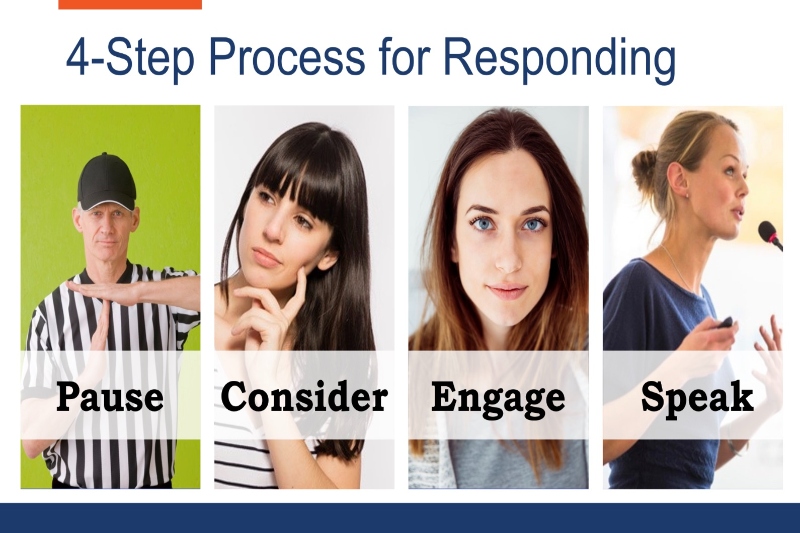Ad hoc speaking situations are a regular occurrence in a professional setting and happen more frequently than we are willing to acknowledge. Should you find yourself in such an unexpected circumstance, be ready to use these techniques to gain additional time before responding.
Be prepared to sound spontaneous
While it is desirable to sound fresh and spontaneous in meetings and presentations, being able to organise your thoughts without having a scripted text is an art worth the practice. Sounding casual while verbalising your ideas in an orderly manner is your goal if you want to impact your audience.
This might come down as a revelation, but the most important thing to remember is that so-called spontaneous speaking should never involve “winging it.”
To achieve this “organised improvisation” and at the same time to come across as natural without giving the impression of following a script, you should take some time to prepare. Read on and train yourself in the techniques that will help you accomplish exactly that.
The firm foundation of the Rule of Three
Recognisably, many people assume that successful impromptu speaking is a personality trait that others are born with. Contrary to common belief, becoming an excellent impromptu speaker is not solely about improvising, nor is it limited to a select group of individuals. It is a skill that we can all become proficient at with little practice. There are tools available to help you think quickly and speak eloquently.
As we explored this topic in a previous article, the most optimal place to start would be to focus on the external factors – your audience. Subsequently, centre your attention on the internal cues and try grounding yourself. Taking this structured approach will settle your nerves and give you the confidence you need to craft a compelling presentation, even at the last minute.
The “Rule of Three” is an excellent starting point here. This approach can be adapted to suit any topic and is based on the concept that we are more likely to remember a list of three items or ideas. You can use the “Rule of Three” as a basis for structuring your presentation and delivering a solid argument, even with barely any time to prepare. Just select the three most important aspects to concentrate on, such as “Three necessary measures to undertake…”, “Three crucial facts to be aware of…” or “Three things to start with…”.
Can you see how it’s working?

Dealing with unanticipated questions
One of the toughest circumstances that may occur in any type of presentation is having to face unexpected, and sometimes awkward, inquiries and queries. In handling these off-the-cuff situations, it is important to remember to buy yourself enough time to respond.
Why not try a technique called the “Four-Step Process for Responding”? This model was developed and is recommended by our curriculum provider and partner, iSpeak. You can use it whenever you need more time to form a reply. Memorise and apply these steps for the successful handling of unexpected questions:

1. Pause
Pausing is a simple technique that allows you to ground yourself, refresh your thoughts and formulate an answer. Additionally, it helps your audience absorb your message. Use a silent pause to replace verbal fillers.
2. Consider
We discussed how careful listening can often provide part of your response in this article. Break eye contact with the person and continue to pause. We recommend no more than a three-second pause. At this stage, you might want to say “let me consider that for a second or two”.
3. Engage
Now it is time to re-establish eye contact with the person. Conducive body language, open, warmth and confident posture.
4. Speak
Reinforce the other person’s words to agree; tactfully amend or correct the original statement to disagree. Keep in mind that commenting directly on what you’ve heard will improve your chances of giving specific responses.
We strongly recommend using the two frameworks for formulating responses – the first being SAR, and the second being RAS. These simple communication models are intended for telling stories or giving examples in a structured and effective way.
SAR is recommended in job interviews or when describing accomplishments and experiences. Here’s what it stands for:
- Situation is the context or background information for the story. It provides the listener with a clear understanding of the circumstances that led up to the action.
- Action is the central part of the story, where you describe the actions you took in response to the situation. Therefore, it’s essential to be specific about what you did and how you did it.
- Result is the outcome or result of the action you took. You should be able to quantify or qualify the result so that the audience can understand the impact of your actions.
Cynthia Oelkers, executive coach at Conclaro, suggests using the RAS model if you enter a hostile environment. What does RAS stand for? Results, Action and Situation. All you have to do is to start with the results first, then move to the actions and share the situation.

Keeping things simple
As communicators, we’re often struggling with conveying messages, but our presentations don’t need to be complicated. Sticking to one of the approaches described here will help you keep things smart, simple, and to the point.
Bear in mind that preparation is the only way to minimise nervousness and maximise confidence before any presentation, even an unplanned one. That is why we recommend keeping these frameworks consistently in mind so you can apply them in any situation. This will give your presentations consistency and structure, no matter how much time you have to prepare.
All of our programmes are designed to help you enhance your skills and develop your Executive Presence in whatever industry you choose.
NxtGEN’s executive-level Spontaneous Presentations programme gives you the knowledge and ability to present confidently at the drop of a hat. Enquire today if you think we can help you or your team.












